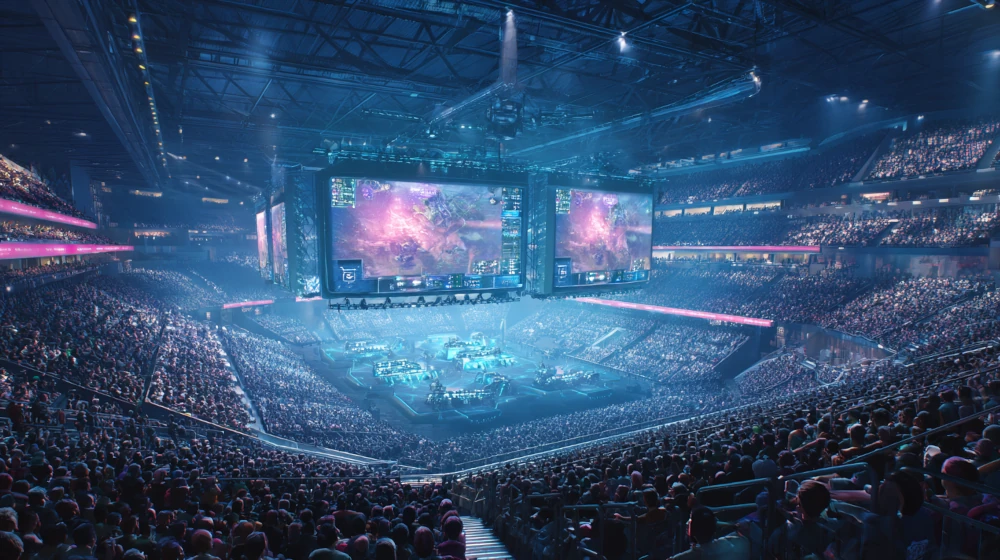Esports is no longer a niche market for basement LAN parties and Mountain Dew sponsorships. In 2025, it’s a full-blown global entertainment juggernaut. With billion-dollar tournaments, brand deals from the likes of Coca-Cola and Louis Vuitton, and millions of streaming viewers per day, competitive gaming has entered the mainstream, and investors are starting to pay attention.
But how do you actually invest in esports? Should you grab stocks in publishers like Activision Blizzard or bet on teams themselves? Or should you go broad with an ETF that bundles esports-related companies into one accessible portfolio?
If you’re new to the esports investing scene, consider this your primer. Here’s how to evaluate esports ETFs, stocks, and the sector’s broader growth potential, without needing to be a gaming expert.
The global esports market is projected to surpass $3.8 billion in revenue by 2027, according to Statista. That includes sponsorships, advertising, media rights, merchandise, and ticket sales. It doesn’t even count the massive impact of game publisher revenues or Twitch and YouTube streaming.
What makes esports so investable is its fanbase, young, global, digitally fluent, and loyal. A 22-year-old who watches League of Legends tournaments today is tomorrow’s consumer of high-end gaming gear, mobile services, and fintech tools, all of which live inside the esports ecosystem.
And unlike traditional sports, esports has minimal physical infrastructure costs, scalable event models, and an always-online audience. The upside? Enormous. The challenge? Picking the right exposure.
Understanding Esports ETFs
Exchange-traded funds (ETFs) offer a smart way to invest in esports without picking individual winners. These funds pool together a basket of stocks from gaming publishers, hardware makers, streaming platforms, and peripheral manufacturers.
Key Players to Know:
- VanEck Video Gaming and Esports ETF (ESPO): Tracks a global index of 25+ gaming-related stocks. Includes companies like NVIDIA, Tencent, and Sea Ltd.
- Global X Video Games & Esports ETF (HERO): Offers exposure to game developers and console manufacturers. Strong in Asia-Pacific holdings.
- Roundhill BITKRAFT Esports & Digital Entertainment ETF (NERD): Focuses on pure-play esports companies and infrastructure players.
These ETFs provide diversified access to a volatile sector, smoothing out the risks of betting on a single company. They trade like regular stocks and often carry lower expense ratios than traditional mutual funds.
The Upside of Gaming Stocks
If you prefer to go hands-on, individual gaming stocks can offer higher upside, but with added volatility. Here’s a quick breakdown of some key names worth tracking in 2025:
Activision Blizzard (NASDAQ: ATVI) – A legacy heavyweight behind franchises like Call of Duty and Overwatch. Despite mixed PR moments, its IP remains a staple in competitive and casual gaming alike.
Tencent (HKEX: 0700) – The Chinese tech giant owns stakes in Riot Games (League of Legends), Epic Games (Fortnite), and hundreds of smaller studios. It’s also a dominant force in mobile gaming across Asia.
Electronic Arts (NASDAQ: EA) – Known for its FIFA (now EA FC) and Madden franchises. EA has leveraged licensing and streaming partnerships to stay competitive in the esports broadcasting scene.
NVIDIA (NASDAQ: NVDA) – Not a game maker, but a crucial enabler. Their GPUs power everything from high-end esports rigs to game servers. Demand spikes every time a new title or console lands.
Sea Ltd. (NYSE: SE) – Based in Southeast Asia, Sea owns Garena (Free Fire), an esports-focused mobile game platform with a strong user base in emerging markets.
These stocks are volatile and often sensitive to earnings, game release schedules, and regulatory noise. But they also represent the backbone of the esports value chain.
Betting on Esports Teams?
Unlike traditional sports, where teams like the New York Yankees or Manchester United are publicly traded or highly valued private entities, most esports orgs remain startup-like, privately owned, venture-funded, and unprofitable.
Teams like FaZe Clan have flirted with public listings (via SPACs), but performance has been rocky. Brand equity is strong, but revenue models are still in flux.
Until more team-based orgs go public and prove sustainable margins, it’s safer to get exposure through the publishers and platforms enabling them.
Risk Factors
Esports investing isn’t all headshots and highlight reels. There are very real risks:
- Regulatory Risk: Especially in Asia, where China has tightened gaming time for minors and scrutinised mobile platforms.
- Overhype Cycles: Not every breakout title becomes a tournament juggernaut. Ask the developers of Anthem or Crucible.
- Hardware Dependency: Semiconductor shortages and component inflation can drag down returns.
- Demographic Shifts: Esports is youth-driven. Keeping content relevant to aging fans while onboarding new ones is key.
That’s why diversified exposure through ETFs is often a smarter entry point for new investors.
Esports Investing
The future of esports investing depends on how the industry tackles a few key areas:
- Mobile Dominance: Will mobile titles dominate competitive play, especially in Asia and Latin America?
- Web3 & Blockchain Gaming: Can decentralised ownership models bring new monetisation to the space?
- Broadcast Rights: Esports needs a scalable revenue model beyond sponsorships. Media rights could be the next frontier.
- Infrastructural Expansion: Expect investments in training facilities, betting platforms, and data analytics to shape the next wave of public listings.
Esports isn’t just play, it’s platform. And as competitive gaming grows more sophisticated, the investing side is maturing too. Whether you dip your toes with an ETF or go all-in on NVIDIA, you’re betting on an industry with global reach, passionate fans, and explosive innovation.
In gaming and investing alike, timing is everything. But if you believe in the long game, esports could be your next power play. Level up your portfolio. The game is only getting started.
From Global Esports Investments to Local South African Play
The world of gaming is undergoing a massive transformation. Esports has exploded into a global entertainment juggernaut, attracting billions in investment, massive audiences, and mainstream brand partnerships. This shift highlights a broader trend: gaming, in all its forms, is becoming a central pillar of entertainment and a significant economic force.
As we’ve explored, investing in esports means understanding the publishers, hardware enablers, and platforms that drive this growth. It’s about recognizing the power of a young, digitally fluent, and loyal fanbase that consumes high-end gaming gear, mobile services, and digital entertainment.
But the digital gaming revolution isn’t just about online tournaments and streaming; it’s also transforming how South Africans experience entertainment and betting at a local level. The same principles of seeking trusted, regulated platforms apply whether you’re investing in a gaming stock or choosing where to play online.
Gaming Locally in South Africa
While the global esports scene captures headlines, the excitement of gaming and betting is also thriving in local communities. For South African players looking for a secure, licensed, and responsible gaming experience, the official Goldrush venues offer a trusted option. These are not just online platforms; they are part of a regulated network providing casino games, sports betting, and exclusive promotions with local support.
If you’re a South African player interested in exploring regulated online casino and sports betting options, it’s crucial to choose official, licensed operators. To find out more about the Goldrush network and locate a trusted venue near you, you can visit their official branch sites page. This ensures you’re engaging with a legitimate, locally compliant platform for your gaming and betting needs.




